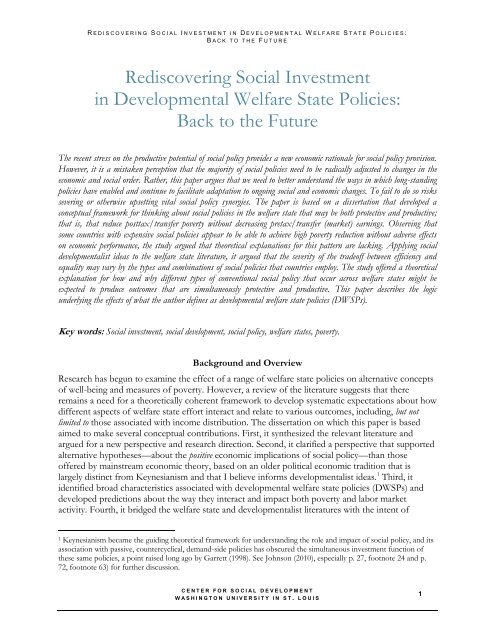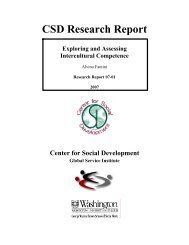Rediscovering social investment in developmental welfare state ...
Rediscovering social investment in developmental welfare state ...
Rediscovering social investment in developmental welfare state ...
You also want an ePaper? Increase the reach of your titles
YUMPU automatically turns print PDFs into web optimized ePapers that Google loves.
R E D I S C O V E R I N G S O C I A L I N V E S T M E N T I N D E V E L O P M E N T A L W E L F A R E S T A T E P O L I C I E S :<br />
B A C K T O T H E F U T U R E<br />
<strong>Rediscover<strong>in</strong>g</strong> Social Investment<br />
<strong>in</strong> Developmental Welfare State Policies:<br />
Back to the Future<br />
The recent stress on the productive potential of <strong>social</strong> policy provides a new economic rationale for <strong>social</strong> policy provision.<br />
However, it is a mistaken perception that the majority of <strong>social</strong> policies need to be radically adjusted to changes <strong>in</strong> the<br />
economic and <strong>social</strong> order. Rather, this paper argues that we need to better understand the ways <strong>in</strong> which long-stand<strong>in</strong>g<br />
policies have enabled and cont<strong>in</strong>ue to facilitate adaptation to ongo<strong>in</strong>g <strong>social</strong> and economic changes. To fail to do so risks<br />
sever<strong>in</strong>g or otherwise upsett<strong>in</strong>g vital <strong>social</strong> policy synergies. The paper is based on a dissertation that developed a<br />
conceptual framework for th<strong>in</strong>k<strong>in</strong>g about <strong>social</strong> policies <strong>in</strong> the <strong>welfare</strong> <strong>state</strong> that may be both protective and productive;<br />
that is, that reduce posttax/transfer poverty without decreas<strong>in</strong>g pretax/transfer (market) earn<strong>in</strong>gs. Observ<strong>in</strong>g that<br />
some countries with expensive <strong>social</strong> policies appear to be able to achieve high poverty reduction without adverse effects<br />
on economic performance, the study argued that theoretical explanations for this pattern are lack<strong>in</strong>g. Apply<strong>in</strong>g <strong>social</strong><br />
<strong>developmental</strong>ist ideas to the <strong>welfare</strong> <strong>state</strong> literature, it argued that the severity of the tradeoff between efficiency and<br />
equality may vary by the types and comb<strong>in</strong>ations of <strong>social</strong> policies that countries employ. The study offered a theoretical<br />
explanation for how and why different types of conventional <strong>social</strong> policy that occur across <strong>welfare</strong> <strong>state</strong>s might be<br />
expected to produce outcomes that are simultaneously protective and productive. This paper describes the logic<br />
underly<strong>in</strong>g the effects of what the author def<strong>in</strong>es as <strong>developmental</strong> <strong>welfare</strong> <strong>state</strong> policies (DWSPs).<br />
Key words: Social <strong><strong>in</strong>vestment</strong>, <strong>social</strong> development, <strong>social</strong> policy, <strong>welfare</strong> <strong>state</strong>s, poverty.<br />
Background and Overview<br />
Research has begun to exam<strong>in</strong>e the effect of a range of <strong>welfare</strong> <strong>state</strong> policies on alternative concepts<br />
of well-be<strong>in</strong>g and measures of poverty. However, a review of the literature suggests that there<br />
rema<strong>in</strong>s a need for a theoretically coherent framework to develop systematic expectations about how<br />
different aspects of <strong>welfare</strong> <strong>state</strong> effort <strong>in</strong>teract and relate to various outcomes, <strong>in</strong>clud<strong>in</strong>g, but not<br />
limited to those associated with <strong>in</strong>come distribution. The dissertation on which this paper is based<br />
aimed to make several conceptual contributions. First, it synthesized the relevant literature and<br />
argued for a new perspective and research direction. Second, it clarified a perspective that supported<br />
alternative hypotheses—about the positive economic implications of <strong>social</strong> policy—than those<br />
offered by ma<strong>in</strong>stream economic theory, based on an older political economic tradition that is<br />
largely dist<strong>in</strong>ct from Keynesianism and that I believe <strong>in</strong>forms <strong>developmental</strong>ist ideas. 1 Third, it<br />
identified broad characteristics associated with <strong>developmental</strong> <strong>welfare</strong> <strong>state</strong> policies (DWSPs) and<br />
developed predictions about the way they <strong>in</strong>teract and impact both poverty and labor market<br />
activity. Fourth, it bridged the <strong>welfare</strong> <strong>state</strong> and <strong>developmental</strong>ist literatures with the <strong>in</strong>tent of<br />
1 Keynesianism became the guid<strong>in</strong>g theoretical framework for understand<strong>in</strong>g the role and impact of <strong>social</strong> policy, and its<br />
association with passive, countercyclical, demand-side policies has obscured the simultaneous <strong><strong>in</strong>vestment</strong> function of<br />
these same policies, a po<strong>in</strong>t raised long ago by Garrett (1998). See Johnson (2010), especially p. 27, footnote 24 and p.<br />
72, footnote 63) for further discussion.<br />
C E N T E R F O R S O C I A L D E V E L O P M E N T<br />
W A S H I N G T O N U N I V E R S I T Y I N S T . L O U I S<br />
1
















